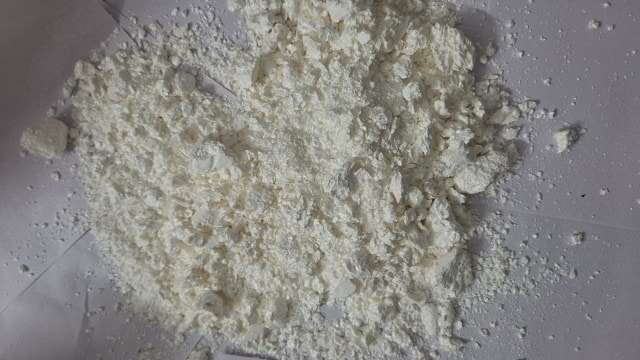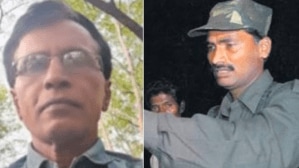Recruits sent abroad for pharma training, dispatched to India: Inside a Nigerian drug cartel’s playbook
From air-tight communications to a leadership prepped to take over in case of arrests, the cartel has been running like a well-oiled ship to smuggle MDMA — till the Delhi Police struck.
 Pure cocaine recovered by the Delhi Police during a drug bust. (Express Photo)
Pure cocaine recovered by the Delhi Police during a drug bust. (Express Photo)In 2013, Nigerian national Lolo was in London studying a sponsored course on health and pharmaceuticals. Among other things, she allegedly learnt how some pharmaceutical grade chemicals — known to be highly addictive — were made.
Police claimed she later joined a Nigerian-based drug cartel in Delhi that peddled MDMA.
The cartel sourced the drug from Colombia and processed it in Delhi. Police said this was where people like Lola came in — her course in the UK trained her for this specific job of processing the pure drug. The mixed substance was then distributed across India and exported to the Australian continent, said police.
Police said in September 2025, Lolo, now in her 50s, was arrested for being part of the cartel that was run by a man named Callistus alias Kallis from Nigeria.
She was the sixth cartel member to be arrested by a Delhi Police team, led by DCP (Crime Branch) Harsh Indora and Inspector Arvind Ahlawat, The Indian Express has learnt. The team had already arrested five members in July, dismantling its first line of leadership in India and seizing 100 kg of MDMA.
“Five people, who were allegedly working for cross-continental drug kingpin Callistus alias Kallis, have been arrested. The police identified the accused as Kameni Philipp, Adore, Victor, Kelechi Chikwe and a person known as ‘Tall Guy’,” Additional CP (Crime) Mangesh Kashyap had said on July 25.
Kallis, police said, operates out of Nigeria, and primarily deals in MDMA and cocaine.
The police were alerted to the racket when a constable tracked a package to a godown in Moti Nagar on June 13. The package, containing more than 800 gm of cocaine, was wrapped among packed suits.
“The parcel led us to Cameroonian national Kameni Philipp (44) in Rajpura. From his possession, 2,012 gm of cocaine was recovered,” Additional CP Kashyap had said.
Phillip, a police officer said, was Kallis’s nephew and his point man in India. But Kallis, anticipating arrests, always had a leader in waiting.
“After Phillip’s arrest, Adore took over the operations in India. Adore was training Lolo, who, like him, knew the pharmaceutical chemical mix which was added to the MDMA to make it highly addictive,” a police officer, who was part of the investigations, said.
“The purpose of mixing is not just cost cutting. If one is addicted to MDMA, they will buy from any cartel. But if the chemical mix is what you are hooked too, then you won’t like the high of any other cartel’s product because they don’t have a similar formula,” the officer added.
Once police caught Adore, Lolo took over the operations.
Therein lay the problem, the police officer said — the dispensable band of leaders and dealers.
“They always have people ready to take over. They train them, send them to foreign universities to learn about pharmaceuticals, and then dispatch them to India. The funds come from Colombian and Mexican drug money. The cartels prop men like Kallis, who then buy their drugs and send it across the world,” the officer said.
According to the data maintained by the Delhi Police, 22 people from the African continent were arrested in 2024 in narcotics-related cases: processing, smuggling to supply. In 2025, till August, 20 people have been arrested.
The data also shows how the drugs smuggled and sold changed in the last year — from heroin to MDMA.
In 2024, the Delhi Police seized 9.12 kg of heroin from these gangs, and just 135.11 grams of MDMA. In 2025, the numbers were almost reversed, with 9.65 kg of MDMA seized from African origin peddlers and compared to just 993 gm of heroin.
According to an officer, police faced another problem when it came to tracking these individuals, especially Kallis’ gang members — their mode of communication.
“The customers are given Nigerian numbers… and they place their order, along with their names and locations. A call centre operator in Nigeria would write it down, and tell Kallis. Kallis would then contact his person in India using a UK number and tell them the drop location but nothing about the customer,” an investigator involved in the case said.
The line of communication is almost air tight. “When we nabbed the delivery people, they didn’t know anything about the customer. We nabbed the customer, they just had a Nigerian number. The cartel also changed its operational areas according to the leader in charge. With Philip, it was Mayur Vihar Metro station and the area near the Jal Board office in Vasant Kunj. When Lolo took over, the drop point was Udyog Vihar Metro station,” the investigator claimed.
Police said the drugs are also routed through Middle-Eastern countries. The cartels rope in women of Indian origin, who travel to the country with packets of pure-grade narcotics taped to their bodies.
“Customs officials are trained to look for specific items based on a traveller’s country of origin,” said an investigative officer. “For instance, passengers arriving from African nations are closely monitored for narcotics, while those from the Middle East are often checked for smuggled gold. However, it’s rare for Middle Eastern women to be scrutinised for drug trafficking.”
Police said during questioning, the arrested gang members have refused to reveal much about Kallis. Apart from giving their families in Nigeria a part of the drug sales in India — 3% on each sold batch — Kallis also has their passports.
“He has threatened to harm their family members if they try to leave the cartel. They can’t leave the country as he has the passports. When we nabbed Lolo from her Gurgaon flat — a plush two-bedroom setup — Rs 12 lakh in cash was found on her. Almost all of it, she claimed, was to pay lawyers to get the peddlers and leaders out on bail, so they would be forced to join again,” an investigator said.
Even if they are deported, investigators said, they come back. “We ban their Nigerian passports, they would get one from Ivory Coast. Phillip has used two different passports to come to India in 2010s and 2020s,” the officer said.
Within a week of Lolo’s arrest, police nabbed another peddler from Gurgaon. Now the investigators are keeping a close track on who Kallis will send to take over the operations.
“The approach is clear. We will keep arresting every batch of leadership that he has in line, till he runs out of people. A total of seven people have been arrested till now,” said a police officer.







